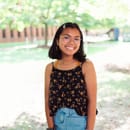Do yourself a favor, and drop by the Office of Diversity, Inclusion, and Multicultural Education in SUB 1. Known warmly as ODIME, it’s a great space where many students can find refuge on campus. Inspirational posters, words of affirmation and photos of students, both past and present, adorn the walls. There’s an area, not unlike a living room, with a coffee table, a comfy couch and shelves of books where anyone can just sit and be. But, it’s the people–the staff and students alike–that make ODIME well…ODIME. And out of the many faces seen around the office, I had the privilege of speaking with Kylie Stamm.
Kylie is an assistant director that overlooks educational programming and provides support for the Asian American, Pacific Islander and Native American/American Indian communities at Mason. She also serves as faculty advisor to the Filipino Cultural Association (FCA), the Asian Pacific American Coalition (APAC), Iota Nu Delta (IND) and Sigma Psi Zeta (SYZ).
“I struggled to figure out my major, my career path…” says Kylie as she reflects on her undergraduate years at James Madison University. We’re sitting in her office; it’s neat but well lived-in, well-loved. “and I think part of it was cause I didn’t see many people who looked like me in a lot of roles.” Eventually, Kylie’s desire to help others led her to psychology, but her future career still felt murky.
“But, when I went to graduate school I decided I wanted to learn more about working with college students.” Then the Asian Student Association asked her to be their faculty advisor. Kylie admits her hesitance to take up the position; as an undergrad, she’d never been in any Asian-identity affiliated student organizations. “I studied a lot about student leadership, but I was nervous because I didn’t know if I had the whole package.” That was in her first year of graduate school, and during that time she began to consider the powerful impact of having an Asian or Asian-American advisor or mentor that students could identify with.
Related: Why College Mentors Are Life Savers
“When it was time to apply for jobs, I wanted to do something working specifically with Asian-American students and identity development.” That’s what lead Kylie to ODIME where she not only handles programming for the Asian-American/Pacific Islander community but the Native American/American Indian community at Mason as well. “It’s really interesting–the way my position is shaped right now. I serve the largest non-white population and the smallest non-white population.”
She points out that the Native American Indigenous Alliance (NAIA) is the only registered student organization on campus specifically for Native American and Indigenous identified students, whereas the Asian Pacific American Coalition (APAC) has 12 official member organizations within it. To put things further into perspective, the ratio between the two communities is roughly 70 students to 6,000.
“In my role working with NAIA, I’m more hands-on in the sense that they don’t have as much people power.”
Kylie continues on the necessities of both groups, “But, there’s this overlap in working with underrepresented and marginalized identities.” Despite the size of the Asian-American community, one issue that unifies it with the Native American/American Indian community is the lack of representation in faculty and staff. She articulates that while it’s clear that both groups have unique needs, there are many similarities and intersections of identities beyond race.
“We’re usually trying to find what voice is missing,” says Kylie, fully aware that a community is never homogenous–and that applies to the communities she serves too. “Or what lens hasn’t been brought to the table in a while. I think that’s a lot of what my work is in serving both those communities and finding ways to make connections and bridges.”
That’s certainly reflected in the theme for this year’s Asian Pacific Heritage Month (APAHM) which is, “our faces, our voices.” It’s been a big year for the representation of Asian Americans and people are now more aware of the importance of it in media, but it goes much further than that. Kylie is glad to see that students are beginning to think not only within the context of movies and television but on their own campus. The themes send a message that along with being seen, the Asian-American community ought to be heard too. “I was really excited when we got to that point,” she says on this year’s theme; Kylie’s been guiding the APAHM planning committee meetings alongside a student staff member at ODIME, Danny Le.
“It’s salient for me, and being able to notice how it’s salient for everyone else has been important too.”
Related: How To Live Your Best Life as An Advocate
APAHM has yet to come (officially it’s in May, but is celebrated at Mason in April so that it’s included in the school year), but Native American Heritage Month was last November. When asked about major highlights, Kylie brings up Indigenous Peoples’ Day–a counter-celebration to Columbus Day. When NAIA’S bill to replace Columbus Day with Indigenous People’s Day was turned down in the faculty senate, it was a huge blow to the community at Mason.
“Coming off that low morale, we still decided to host an event and call it Indigenous Peoples’ Day Gathering.” It was done as a way to reclaim that day and to celebrate the Native and Indigenous people that inhabited this land long before any European did. “I learned so much in advocacy with them about ways that you can still take up space or send messages without anything overt–it was a celebration.”
When asked about some of her favorite events on campus, Kylie had to mention the Black Excellence Gala. “Similar to why I love Indigenous People’s Day, any event that completely centers around the celebration, uplifting and amplifying of a particular population who doesn’t always get that is powerful to see.”
February 22nd marked the 4th annual Black Excellence Gala; it’s a night of recognition for the Black students in the Mason community complete with awards, speakers and performances. “It’s so hard doing the work I do sometimes,” says Kylie on the ways in which she’s tasked with challenges of policy, advocacy and students experiencing discrimination or microaggressions. “All this stuff, it’s so heavy. So when we get to have these special events it’s not about anything else. They just get to be.”
As many people of marginalized identities will know, the ability to exist without explanation is a privilege not everyone is afforded. But, Kylie, among a handful of other people on campus, is working hard to create more spaces where we can be better seen, heard and understood.



